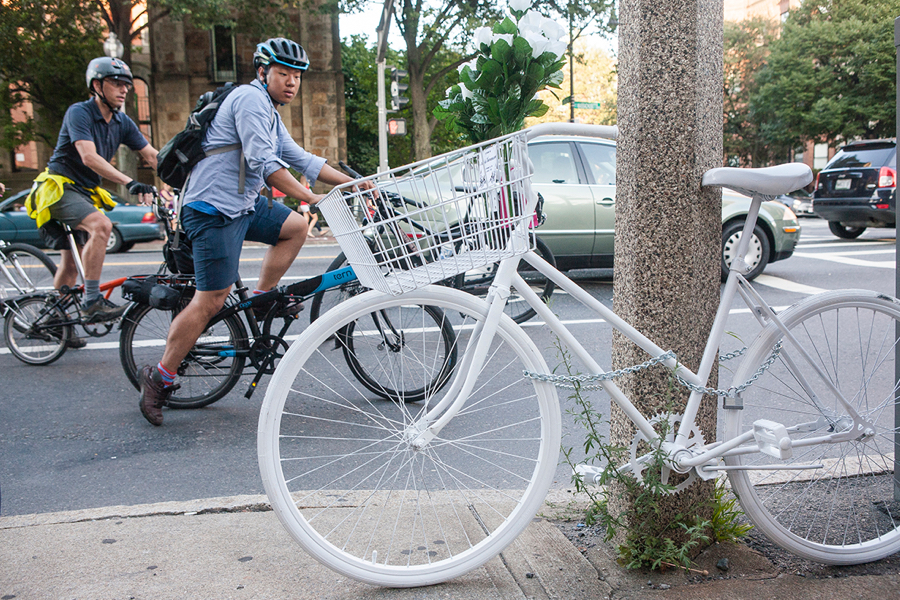Bike Activists, Armed with Video of Fatal 2015 Back Bay Crash, Say Police Got It Wrong
They want charges filed against the driver whose truck ran over doctor Anita Kurmann.

Photo by Olga Khvan
Bike activists say the video says it all: When it comes to the death of Anita Kurmann, a Swiss doctor and Cambridge resident killed in a 2015 Back Bay bicycle crash, police got it wrong.
The group MassBike has shared footage it obtained from police of the collision, which occurred at the corner of Mass. Ave. and Beacon Street. From several angles, the clips document the 16 seconds that led up to the fatal crash, as both 38-year-old Kurmann and an 18-wheeler truck, driven by Matthew Levari, of New Jersey, approach the intersection. The truck can be seen swinging left before turning right, as Kurmann waits in a lane for buses. Then Kurman is struck by the truck’s rear tires, and Levari continues driving. Levari allegedly did not call police to identify himself as the driver until 10 hours later.
What exactly the video shows depends on who you ask. Police have determined that Kurmann was at fault, that she should not have been in the bus lane, and that she had plenty of time to realize the truck was turning. But MassBike believes the video (which they have dissected in an exhaustive, second-by-second report) is proof Levari acted recklessly, and they are now urging the department to reconsider. They have called for Levari to be charged with involuntary manslaughter.
“This video shows this doctor is doing everything right. She is doing everything legally,” Richard Fries, executive director of MassBike, said in a statement. “The truck driver, having overtaken her, operates without due caution or care, crushes this woman to death, and drives away.”
Count to 16. That’s how long Anita Kurmann was in view of the driver who ran her over and drove away. To this day, the police blame the cyclist. Watch the video and decide for yourself. #16seconds https://t.co/ydkPjs4Niv
— LowellBikeCoalition (@LowellBikes) January 23, 2018
MassBike argues that the driver should have known there was a biker to his right, and cites a law that says “No person operating a vehicle that overtakes and passes a bicyclist proceeding in the same direction shall make a right turn at an intersection or driveway unless the turn can be made at a safe distance from the bicyclist at a speed that is reasonable and proper.” Police, though, note that Kurmann was traveling in a bus lane, and that the driver had activated his blinker for 8 seconds before turning. Officials from the police department and district attorney’s office say there was not and still isn’t enough evidence to pin the blame solely on the driver for Kurmann’s death. “[W]e have an ethical obligation not to charge a case we know we can’t prove,” DA spokesman Jake Wark told the Boston Globe.
Advocates for bicyclists consider the 2015 incident a tragic milestone in their fight for better protections on roads in a city where, according to MassBike, 33 people have died while riding bikes since 2015. Charges were only brought in six cases and there were only two convictions, and MassBike says that is sending exactly the wrong message to drivers about sharing the road. “This lack of accountability creates a serious threat to public safety for all citizens on public roads, particularly bicyclists,” the group wrote in a letter to Boston Police Superintendent Gregory Long.
At a “ghost bike” ceremony held at the site weeks after the crash, speakers urged mourners to get involved. That has manifested itself in rallies, other ghost bike ceremonies, and guerrilla tactics to pressure the city to install protected bike lanes, involving surreptitiously placed potted plants, cardboard cutouts, spray paint, and human chains.
An effort is also underway to pass a bill that would, among other measures, require wider-angle mirrors and side guards on large state-run vehicles. There have been success stories on Beacon Hill. After a duck boat collision that killed 28-year-old Allison Warmuth, who was riding a motorized scooter, the legislature quickly passed a slate of new safety measures for tour vehicles, including new cameras and sensors, and banned the practice of having one employee both drive a duck boat and give a tour at the same time.


